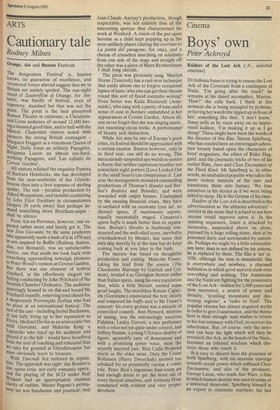ARTS
Cautionary tale
Rodney Manes
Orange, Aix and Buxton Festivals The designation 'Festival' is, heaven knows, no guarantee of excellence, and occasional forays abroad suggest that we in Britain are unduly spoiled. The one-night stand of Zauberflote at Orange, for instance, was hardly of festival, even of repertory, standard but that was not the Point. The point is the best preserved Roman Theatre in existence, a Christiansand-Lions audience of around 12,000 having a damned good time, and to hell with the Mistral. Chauvinist visitors noted with pleasure the strong British contingent — Margaret Haggart as a venomous Queen of Night, Della Jones an unlikely Papagena, Benjamin Luxon an almost too-hardworking Papageno, and 'Les enfants du Covent Garden'.
All visitors relished the exquisite Pamina of Barbara Hendricks; she has developed from the near-soubrette of her Glyndebourne days into a lyric soprano of sterling quality. The rest — peculiar production by Alfred Woppmann, and tasteful conducting by, John Eliot Gardiner in circumstances (Singers 20 yards away) that perhaps demand something more Beecham-esque — shall be silence.
From Aix-en-Provence, however, one expected rather more and barely got it. The new Don Giovanni, by the same producers Who apparently made a hash of it in 1976 and M sets inspired by Buffet (Railway Station, alas, not Bernard), was an unbelievable horror, one that made me look back with something approaching nostalgic pleasure to Peter Wood's version at Covent Garden. But there was one element of festival ,Standard, in the effortlessly elegant yet feeling conducting by John Pritchard of the Scottish Chamber Orchestra. The audience unerringly homed in on this and booed Mr Pritchard roundly, reserving loud cheers for a desperately Provencale Zerlina who had 00 place at an international festival. The rest of the cast — including Isobel Buchanan, at last fully living up to her reputation as Michael Devlin as an aristocratic but Mild Giovanni, and Malcolm King, a Leporello who sized up his audience and Played it to the hilt — would have benefited from the sort of coaching and rehearsal that We take for granted at Glyndebourne but must obviously learn to treasure. With Tancredi Aix restored its reputation. The approach was right: this Rossini is late opera seria, not early romantic opera, and the playing of the SCO under Ralf Weikert had an appropriately classical clarity of outline. Mauro Pagano's permanent set was handsome and practical, and Jean-Claude Auvray's production, though respectable, was not entirely free of the interesting apergus that characterised his work at Wexford. A vision of the put-upon heroine as a child kept popping up in the most unlikely places (during the overture to La pietra del paragone, for one), and a chorus of crusaders marching on solemnly from one side of the stage and straight off the other was a piece of Marx Brotherliness I shall long cherish.
The piece was gloriously sung. Marilyn Home (Tancredi) has a cast-iron technique that easily allows one to forgive occasional lapses of taste: who else can get their throats round this sort of florid contralto writing? Even better was Katia Ricciarelli (Amenaide), who sang with a purity of tone and a sense of ease in fioriture unmatched in her appearances at Covent Garden. Above all, one never forgot that she was singing music, not executing circus tricks. A performance of beauty and distinction.
While Aix may be one of Europe's great cities, its festival should be approached with a certain caution. Buxton however, only in its third year, can still do no wrong. This miraculously unspoiled spa wields so potent a charm that neither capricious weather nor somnolent night porters (Love Locked Out in the small hours) can compromise it. Last year the management mounted outstanding productions of Thomas's Hamlet and Berlioz's Beatrice and Benedict, and were rewarded with empty houses. Unabashed by the ensuing financial crises, they have re-surfaced with an economy (one set, no chorus) opera, II matrimonio segreto, equally successfully staged. Cimarosa's opera buffa is much better than its reputation. Bertati's libretto is faultlessly constructed and the well-oiled score, inevitably overshadowed by Mozart, has tunes that may skip merrily by at the time but do keep coming back at you later in the bath. The success was based on thoughtful production and casting. Malcolm Fraser, taking his lead from the source (The Clandestine Marriage by Garrick and Colman), treated it as Georgian theatre rather than Italian opera, using his own translation that, while a little blatant, earned some good laughs. The matchless Renato Capecchi (Geronimo) enunciated the text clearly and tempered his buffo zeal to Mr Fraser's concept: his every gesture was a miracle of controlled comedy. Ann Howard, mistress of timing, was the entrancingly uxorious Fidalma; Lesley Garrett, .a star performer with a voice not yet quite under control, and Jeffrey Stamm, a young US tenor chubby of figure, agreeably zany of demeanour and with a promising spinto voice, were the secretly married pair; Rita Cullis flounced nicely as the elder sister. Only the Count Robinson (Harry Dworchak) seemed too subdued for so potentially outsize a comic role. Peter Rice's ingenious four-room set had enough doors to get the most out of every farcical situation, and Anthony Hose conducted with evident and very proper devotion.


































 Previous page
Previous page